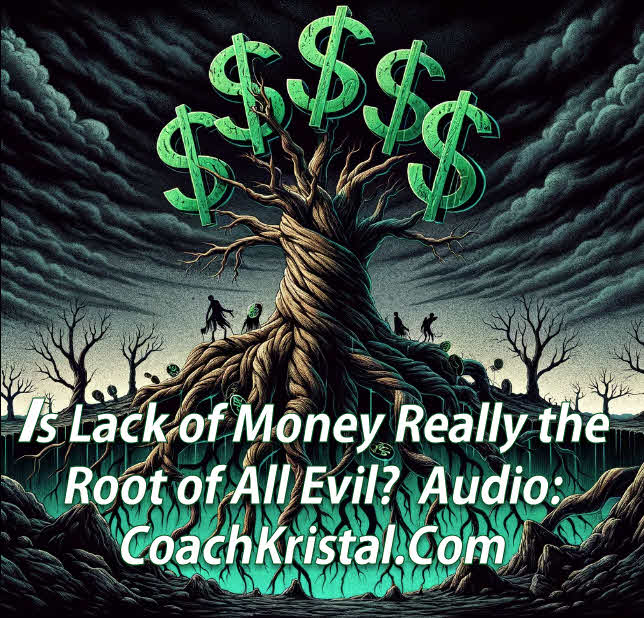Introduction: Exploring the Popular Belief and Its Origins

Part 1 Audio

“The Lack Of Money Is The Root Of All Evil”
Contrary to popular belief, the lack of money is not the root of all evil. While financial struggles can certainly lead to stress and hardship, it is important to explore the origins of this belief and challenge its validity.
The notion that money is the root of all evil can be traced back to biblical scripture, where it is often misquoted as “money is the root of all evil.” In reality, the scripture states that “the love of money is the root of all kinds of evil.”

This distinction is crucial. It highlights that it is not money itself that causes harm, but rather our excessive attachment and obsession with it. Money becomes a tool for greed, corruption, and unethical behavior when we prioritize its accumulation above all else.
It is essential to recognize that there are countless examples of individuals who have little or no wealth but lead fulfilling lives filled with love, compassion, and integrity. Happiness and fulfillment cannot solely be measured by financial status.
By questioning this popular belief and understanding its origins, we can shift our focus towards cultivating positive values such as empathy, kindness, and generosity. Money should be seen as a means to an end rather than an end in itself.
Ultimately, it is our actions and intentions that determine whether we contribute positively or negatively to society. Blaming lack of money as the root cause for all evils oversimplifies complex societal issues and fails to address deeper underlying factors such as systemic inequalities or personal choices.
Let us challenge this belief and strive towards a more nuanced understanding of wealth’s role in our lives.
The True Culprit: Unhealthy Attitudes and Behaviors Towards Money

It’s time to address the true culprit behind our unhealthy attitudes and behaviors towards money. The problem lies not in the currency itself, but in our money mindset and the way we perceive and interact with it.
Many individuals have developed an unhealthy relationship with money, viewing it as the ultimate measure of success and happiness. This materialistic mindset has fueled a relentless pursuit of wealth, often at the expense of our well-being and ethical values.
Greed and corruption have become prevalent in our society as a result of this distorted view of money. Instead of using wealth as a tool for positive change, it has become an end in itself, leading to unethical practices and a lack of empathy towards others.
To break free from this destructive cycle, we must challenge our materialistic beliefs and redefine what true prosperity means. It’s essential to cultivate a healthier money mindset that prioritizes financial well-being while also valuing relationships, personal growth, and contributing to society.
By acknowledging the negative impact of greed and materialism on ourselves and others, we can start shifting towards a more balanced approach to money. Let us strive for financial success without compromising integrity or losing sight of what truly matters in life.
The Role of Societal Structures in Creating Wealth Inequality

Societal structures play a significant role in the creation and perpetuation of wealth inequality. Economic systems, influenced by these structures, can either promote equal opportunities for all or contribute to a vicious poverty cycle.
It is important to recognize that wealth inequality is not solely a result of individual actions or abilities. Rather, it is often rooted in the social structures that govern our economic systems. These structures determine access to resources, education, and opportunities, which in turn shape an individual’s ability to accumulate wealth.
When societal structures are designed in a way that favors certain groups or perpetuates systemic disadvantages, wealth inequality becomes deeply ingrained. This can lead to a cycle where those born into poverty struggle to escape its grasp, while those with inherited wealth continue to accumulate even more.
Addressing wealth inequality requires an examination and reform of these societal structures. It involves creating economic systems that provide equal opportunities for all individuals regardless of their background or circumstances. By dismantling barriers and implementing policies that promote fairness and equality, we can begin to break the cycle of poverty and create a more just society for everyone.
Part 2 Audio

“Lack Of Money Is The Root Of All Evil”
Beyond Money: Other Factors Influencing Good or Evil Actions
When it comes to determining good or evil actions, there are several factors beyond money that play a crucial role. Moral values, personal choices, empathy and compassion, and character development all contribute to the decisions we make.
It is important to recognize that our moral values shape our actions. These values act as guiding principles that help us distinguish between right and wrong. Personal choices also come into play, as individuals have the autonomy to make decisions based on their own beliefs and principles.
Empathy and compassion are essential in influencing our actions towards others. The ability to understand and share the feelings of others can lead us towards acts of kindness and generosity. Additionally, character development plays a significant role in shaping our behavior over time.
It is important for individuals to reflect on these factors when making decisions, as they have the power to influence not only their own lives but also the lives of those around them. By considering moral values, personal choices, empathy and compassion, and character development, we can strive towards making more ethical choices in our daily lives.
Rewiring Our Perception: Shifting Focus to Personal Growth and Contribution

It’s time to rewire our perception and shift our focus from wealth to well-being. Success should not be solely defined by money, but rather by personal growth and contribution.
We need to break free from the notion that material possessions are the ultimate measure of success. Instead, we should find fulfillment in non-material pursuits, such as personal development, meaningful relationships, and making a positive impact on others.
By shifting our mindset towards personal growth and contribution, we can create a more balanced and fulfilling life. It’s not about accumulating wealth for the sake of it, but about finding purpose and meaning in our everyday actions.
Let’s redefine success beyond money and embrace the journey of self-improvement and making a difference in the lives of others. It’s time to prioritize well-being over mere financial gain.
Conclusion: Rethinking the Blame on Lack of Money as the Root of All Evil

In conclusion, it is imperative that we rethink the notion of blaming lack of money as the root of all evil. While financial constraints can certainly contribute to challenges and hardships, it is important to recognize that there are numerous other factors at play in shaping human behavior and societal issues.
By solely attributing problems to a lack of money, we oversimplify complex issues and overlook the influence of other factors such as systemic inequalities, social structures, and individual choices. It is crucial to adopt a more nuanced perspective that takes into account the multifaceted nature of these problems.
Instead of placing blame solely on the absence of financial resources, we should focus on addressing underlying causes and promoting solutions that tackle structural inequalities, improve access to education and opportunities, foster empathy and compassion, and promote ethical decision-making.
By shifting our mindset away from a simplistic blame game centered around money, we can foster a more comprehensive understanding of societal issues and work towards creating a fairer and more equitable world for all.

Related:
All About How Childhood Shapes Our Financial Future
Anxiety Over Money Money Dysmorphia Guide
Earn a living while traveling or living remotely
Digital Nomads
Cultivating Prosperity and A Growth Mindset:
Female Entrepreneur Wealth Building Tips